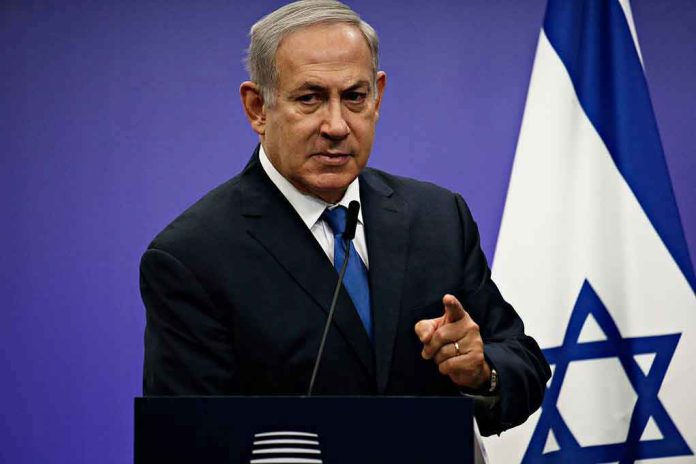
Alan Dershowitz’s public push to pardon Israeli Prime Minister Benjamin Netanyahu has ignited fierce debate over politicized prosecutions and the stability of a key U.S. ally during wartime.
Story Snapshot
- Harvard Law’s Alan Dershowitz urges Israeli President Herzog to pardon Netanyahu amid corruption trial.
- Dershowitz claims the charges are politically motivated and undermine Israel’s national interests.
- The call coincides with Israel’s military campaign in Gaza and heightened leadership instability.
- Presidential pardon power rarely used for sitting officials; no official Israeli response yet.
American Legal Scholar Enters Israeli Political Turmoil
On October 13, 2025, Harvard Law professor emeritus Alan Dershowitz appeared on Newsmax to make a high-profile case for Israeli President Isaac Herzog to pardon Prime Minister Benjamin Netanyahu. Dershowitz argued the ongoing prosecution of Netanyahu distracts from essential diplomatic efforts and national security priorities, especially as Israel remains locked in conflict with Hamas in Gaza. He described the charges as lacking substance and claimed that political motivations, rather than justice, were driving the trial and threatening Israel’s stability.
Dershowitz’s intervention stands out not only for its timing but also for its international dimension. As a prominent American legal expert and longtime Netanyahu advisor, Dershowitz’s public advocacy brings U.S. attention to the internal political battles of Israel. He framed his argument as a matter of justice, warning that politicized prosecutions risk undermining Israel’s ability to respond effectively to threats. The televised remarks have drawn immediate coverage from media outlets in both countries, highlighting the unusual nature of cross-border influence in domestic legal affairs.
Netanyahu’s Trial: A Politicized Drama Amid National Crisis
Benjamin Netanyahu, Israel’s longest-serving prime minister, has faced a series of corruption charges since 2019, including bribery, fraud, and breach of trust. The legal proceedings have played out against a backdrop of repeated elections and intense political rivalry, with opposition factions accusing Netanyahu of eroding democratic norms to retain power. Documentary evidence and media reports suggest the judicial process is deeply intertwined with political maneuvering, fueling public division and uncertainty about the legitimacy of the trial.
The current security crisis amplifies the stakes. Israel’s ongoing military campaign against Hamas adds urgency to debates over leadership stability and executive decision-making. Dershowitz’s call for a pardon comes at a rare juncture, where constitutional powers to grant clemency could directly impact national security. Historically, Israeli presidents have used pardons sparingly, typically for lower-level officials or symbolic acts, making this case virtually unprecedented. The closest parallel may be U.S. presidential pardons, which Dershowitz has previously discussed in relation to Donald Trump’s legal challenges.
Stakeholders, Power, and Deepening Polarization
The key figures in this episode include Dershowitz, Netanyahu, President Herzog, the Israeli judiciary, and sharply divided political factions. Dershowitz, leveraging his reputation and media presence, argues for prioritizing national interests over legal battles. Netanyahu seeks to defend his legacy and leadership, while Herzog must balance constitutional authority, political fallout, and public opinion in considering intervention. The judiciary faces immense pressure to uphold the rule of law amid escalating accusations of politicization.
Public opinion in Israel is fractured, with supporters viewing Dershowitz’s advocacy as validation of their belief in a politically motivated witch hunt, while opponents see the pardon proposal as a direct challenge to legal accountability. International observers and legal scholars warn that granting a pardon could set a dangerous precedent, potentially eroding the independence of the judiciary and undermining democratic norms. The lack of an official response from Herzog and the government underscores the complexity and volatility of the situation.
Consequences for Democracy and Stability
In the short term, Dershowitz’s call for a pardon has escalated political polarization and drawn global attention to Israel’s judicial processes. Media coverage underscores the broader implications for democratic governance and rule of law. If a pardon is granted, it could undermine public trust in legal institutions, signaling that high-profile leaders are immune from accountability during crises. Economic uncertainty may increase as investors react to prolonged instability and leadership questions.
Long-term consequences hinge on the fate of the judiciary and the precedent set by any executive intervention. A presidential pardon for a sitting prime minister would be a landmark event, with potential ripple effects across Israel’s legal system, political landscape, and international standing. The case will continue to be closely watched by legal professionals, policymakers, and the global community, as the debate over justice, security, and executive power evolves in real time.
Sources:
Alan Dershowitz Backs Pardon For Netanyahu Amid War And Legal Woes
Alan Dershowitz Makes Case For Pardoning Netanyahu
Alan Dershowitz Calls For Netanyahu Pardon
Ynet: Netanyahu’s Legal Battle





